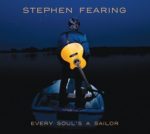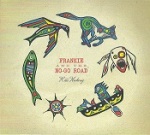 Do turbulent social and political conditions create a fertile environment for artists? It’s a theory that’s had some support and I suspect we’re about to see and hear a lot more evidence over the next few years. The inauguration hasn’t taken place yet but I’ve already heard a couple of anti-Trump songs. Rita Hosking has replied to the infamous pussy-grabbing comments with a song that suggests a prompt and effective remedy of a toecap to the testicles, and Stephen Fearing’s song “Blowhard Nation” on “Every Soul’s a Sailor” neatly skewers the braggadocio of the president-elect and the motives of his supporters. The Merle Haggard/outlaw country arrangement of the song stands apart from the rest of the album, highlighting the song’s message as a contrast to the gentler themes elsewhere.
Do turbulent social and political conditions create a fertile environment for artists? It’s a theory that’s had some support and I suspect we’re about to see and hear a lot more evidence over the next few years. The inauguration hasn’t taken place yet but I’ve already heard a couple of anti-Trump songs. Rita Hosking has replied to the infamous pussy-grabbing comments with a song that suggests a prompt and effective remedy of a toecap to the testicles, and Stephen Fearing’s song “Blowhard Nation” on “Every Soul’s a Sailor” neatly skewers the braggadocio of the president-elect and the motives of his supporters. The Merle Haggard/outlaw country arrangement of the song stands apart from the rest of the album, highlighting the song’s message as a contrast to the gentler themes elsewhere.
Stephen Fearing is a genuinely great singer/songwriter/guitar player with an equal emphasis on all three elements. The lyrical themes of the songs range from the elegaic “Gone but Not Forgotten”, through the melancholy regret of “Red Lights in the Rain” (as powerful an image as I’ve heard for leaving a relationship) to the regret for a passing era of “Things We Did”. The musical stylings are equally varied, from the AOR feel of the opener “Put Your Money Where your Mouth Is” to the raucous, rambunctious rebel stylings of “Blowhard Nation” which has maybe a hint of uptempo Jim Croce stylings thrown in as well. Each song has the perfect arrangement to emphasise its lyrical content and, whether it’s the skiffle/rockabilly feel of “Love Like Water” with acoustic guitar and stand-up bass, to the album’s closer “Every Soul’s A Sailor” with a close-miked vocal, two electric guitars and no bass or drums. It’s an unusual voicing, but it’s just right for the song, and that’s what it’s all about.
This is an album where the standards are high throughout whether you’re interested in well-constructed and inspired songs, evocative arrangements or outstanding vocal performances. There are no weak spots and dozens of highlights.
I’ll leave you with a lyric from “Blowhard Nation” concerning politicians generally:
‘Make no mistake, when they’re showing you the cake, they’ll never let you eat it now’ We might just be entering a new era of protest songs.
“Every Soul’s A Sailor” is released on Friday February 3rd on LowdenProud Records (LOWD60161)
 Concept album? Well. I’m not quite sure that’s an adequate description for Rita Hosking’s sixth studio album, “Frankie and the No-Go Road”. You can just take it at face value as a collection of twelve beautifully-crafted songs, delivered with stripped-back folk/Americana arrangements and a striking, sometimes fragile but always impassioned, voice; it’s all of those things but it’s much more as well. The album takes the popular mythological theme of the questing hero and weaves this through the fabric of our journey through life while interleaving mystical and mythological references from various cultures. Each of the songs has a subtitle relating to the progress of the mythological hero, Frankie (whose gender isn’t specified) through their heroic quest.
Concept album? Well. I’m not quite sure that’s an adequate description for Rita Hosking’s sixth studio album, “Frankie and the No-Go Road”. You can just take it at face value as a collection of twelve beautifully-crafted songs, delivered with stripped-back folk/Americana arrangements and a striking, sometimes fragile but always impassioned, voice; it’s all of those things but it’s much more as well. The album takes the popular mythological theme of the questing hero and weaves this through the fabric of our journey through life while interleaving mystical and mythological references from various cultures. Each of the songs has a subtitle relating to the progress of the mythological hero, Frankie (whose gender isn’t specified) through their heroic quest.
But before we go any further, let’s hear it for the guys in the band; Rich Brotherton (playing virtually everything plus production and backing vocals), Glen Fukunaga (upright bass), Don Wynn (drums, percussion), Sean Feder (dobro, djembe), Kora Feder (harmony vocals) and Andy Lentz (violin) supply masterfully understated backing for Rita’s guitars, banjo, harmonica and vocals, creating an understated soundscape that evokes “Harvest” and “After the Goldrush” and perhaps the austerity of Springsteen’s “Nebraska”.
The opening songs “A Better Day” and “Wetiko” set the scene for the album; “A Better Day” is a delicate exposition, gently identifying a malaise in the writer’s life and creating the link with fictional hero Frankie. Rita’s voice, with a hint of vibrato, and the mournful harmonica create an aura of melancholy which is crying out for resolution. “Wetiko” identifies the malaise with the Native American concept of a parasitic psychosis, devouring the individual from within, relying on a sparse banjo/drums/bass arrangement to evoke menace and malice. As the album progresses the two narrative strands are woven ever tighter with episodes of denial (“Magic Carpet”) and resolve (“I See Storms”) before the quest reaches its crisis.
“Black Hole”, with its hints at a support group meeting and “Mama Said” reveal that the demons are within and always have been. The telling image is that of a dog dying of thirst but afraid to drink because of his reflection in the water in “Mama Said”; once that fear is overcome by a leap of faith, then the journey becomes easier. The quest continues with the hazardous journey home, challenges to the outcomes, and a sharing of the lessons learned in “Sing” which finally reunites the two narrative strands with a simple solution; put your faith in the natural world and express yourself freely.
“Frankie and the No-Go Road” is a fascinating and haunting piece of work; the instrumentation is sparse and the vocals powerful, yet simultaneously vulnerable, pulling us in to two narratives linking the inner and outer worlds. It’s an ambitious concept, but the deliberate musical understatement and complexity of the narratives and themes create a tremendously satisfying album which occupies the mind long after the last notes fade away.
“Frankie and the No-Go Road” is released in the UK on Friday October 30th.


